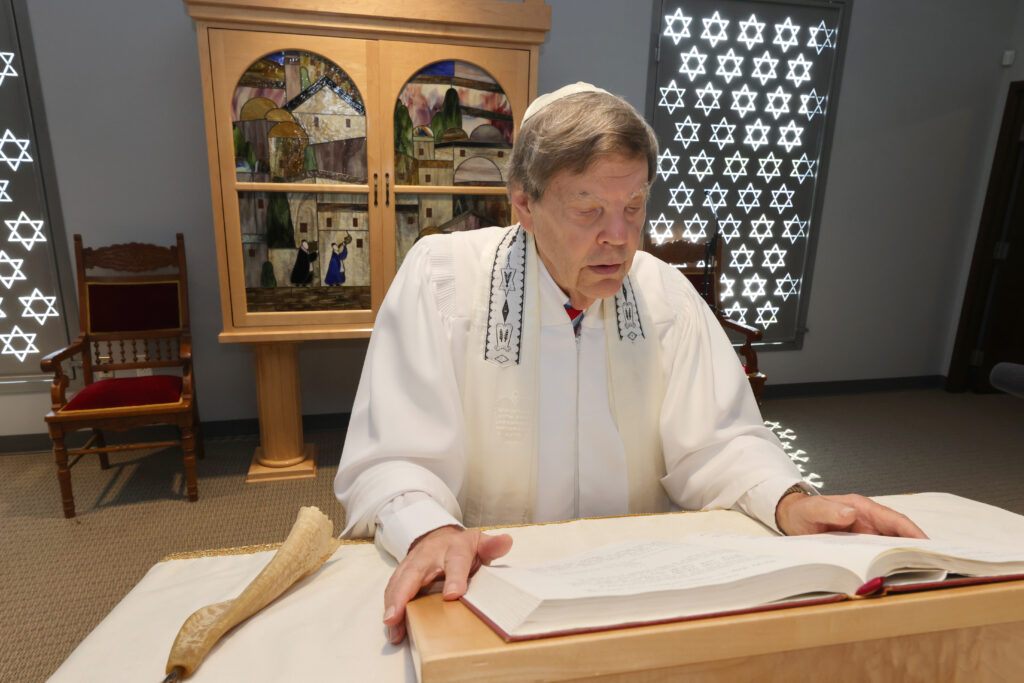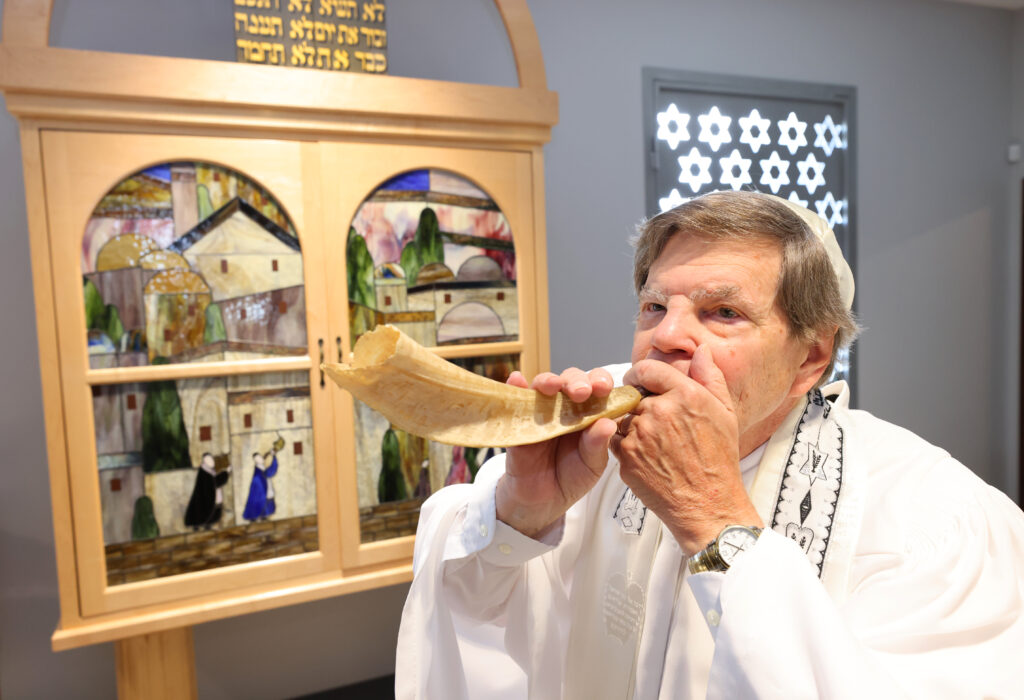Rosh Hashanah in Ocala: The new year welcomed in pandemic-muted celebration

Rabbi Harold Jaye reads the Scripture at Temple B’Nai Darom in Ocala, Fla.on Monday, August 30, 2021. Rabbi Jaye and other members of Temple B’Nai Darom are preparing for the Jewish High Holidays, starting with Rosh Hashanah and ending with Yom Kippur. [Bruce Ackerman/Ocala Gazette] 2021.

Rabbi Harold Jaye reads the Scripture at Temple B’Nai Darom in Ocala on Aug. 30. [Bruce Ackerman/Ocala Gazette]
Temple Beth Sholom will observe Rosh Hashanah, the Jewish New Year, and Yom Kippur for the last time at its synagogue at 1109 NE Eighth Ave., its home for the past 45 years. The Reform congregation will move into a new building in December. The Ocala Tree of Life Sanctuary will be home to the synagogue and First Congregational United Church of Christ.
Sholom’s spiritual leader, Rabbi Ze’ev Harari, said even though the High Holy Days services will take place via Zoom due to the ongoing COVID-19 pandemic, the observance will be poignant and heartfelt.
“It’s going to be an emotional and bittersweet feeling,” said Harari, a native of Haifa, Israel who’s served the congregation for the past 10 years. “Bitter because we will miss it; sweet because we are moving into a beautiful and new modern building.”
The most important dates on the Jewish calendar, the High Holy Days begin with Rosh Hashanah Monday (Sept. 6) followed by a 10-day period of soul-searching and self-examination of one’s life that culminates with Yom Kippur on Sept. 15, the holiest day of the year.
Based on lunar calculations, Rosh Hashanah is celebrated on the first day of Tishri, the seventh month of the Jewish calendar. This year is 5782.
The blowing of the shofar, or ram’s horn, signals the beginning of the observance. During the New Year festivities Jews traditionally eat sweet foods like apples dipped in honey, cakes, and challah bread which symbolize the sweetness of a new year.
“The Jewish New Year is a religious holiday; there are days of introspection, reflection and judgment,” said Harari. “We believe during the High Holy Days God decides who should live and who should die in the coming year as well as how they will die.”
Yom Kippur, or the Day of Atonement, and the 10 days leading up to it, gives Jews a chance to make an extra effort to come clean before God, he said. There’s prayer and fasting, and atoning for one’s sins on Yom Kippur.
“It’s a chance to repent and get right with God,” said Harari.

Rabbi Harold Jaye practices blowing the Shofar at Temple B’Nai Darom in Ocala on Aug. 30. [Bruce Ackerman/Ocala Gazette]
“It’s serious but not somber; there’s a positive note on the Day of Atonement,” said Jaye, who’s been at B’Nai Darom since the mid-1980s. “One faces the new year with a clean slate and you feel that you made your confessions before God and made peace with those you might have offended.”
Both temples trace their roots back to the United Hebrews of Ocala, founded in the 1870s. Beth Sholom was created following a membership split in 1975, when B’nai Darom, as the congregation was then called, moved to Silver Springs Shores. It moved to its current location in 2018, Jaye said.
B’nai Darom will have in-person services for members only with face masks and social distancing requirements in place due to COVID-19, but will also have live feeds on its website and Facebook page for anyone who wants to watch, he said.
“We had hoped to allow everyone at the services, but with the rise in COVID cases we can’t,” said Jaye.
Even though the pandemic has caused services to be scaled back, it doesn’t change the importance of Rosh Hashanah and Yom Kippur, he added.
“We can still focus on the meaning of these very important and beautiful religious holidays,” said Jaye. “It doesn’t change the fact that for Jews it’s a very significant and special time.”
Jews who don’t regularly attend Sabbath services during the year usually show up for High Holy Days services.
“It’s much the same as Christians do with Christmas and Easter,” said Jaye, a native of Columbus, Ohio. “It’s the only time of year they attend services.”
Beth Sholom’s Harari said he’ll observe the High Holy Days this year with an eye towards his synagogue’s upcoming move and a heart-tugging remembrance towards those who have passed away due to the pandemic.
“Having seen so many deaths because of COVID, the High Holy Days will have special meaning this year,” he said.





